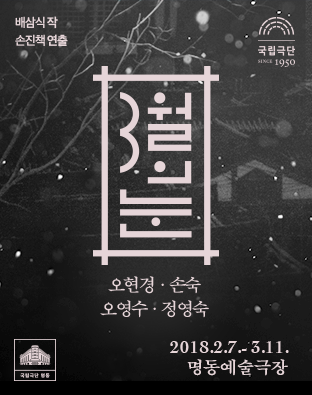
Snow in March
07 Feb, 2018~
11 Mar, 2018
-
Venue
Myeongdong Theater
-
Genre
Theater
-
Show Time
Weekdays 19:30 ㅣWeekends 15:00ㅣNo performance on Tuesday
2/12(Mon), 2/15(Thu), 2/16(Fri) No performance
2/13(Tue) 19:30, 2/14(Wed), 2/21(Wed), 3/1(Thu) 15:00
3/10(Sat) 15:00, 19:30 -
Tickets
R 50,000KRW | S 35,000KRW | A 20,000KRW
-
Enquiry
1644-2003 (+82-2-3279-2260, 2263)
Language Korean
English subtitles will be provided on every Thursday &Sunday.
* Please ensure you arrive 30mins before the program time. The box office can be busy and you may need to queue.
* We will endeavor to admit latecomers at the first suitable opportunity, which may be the interval. For some Events late admission cannot be guaranteed.
* Re-entry is mostly NOT allowed. In an exceptional case of re-entering, you may be seated in alternate seat locations to avoid disruption of the performance.
* The discount on tickets will only be available when presented with the necessary papers or documents. Tickets have to be paid in full when they are not presented.

“Valuable Harvest of Korean Theater” - Joongang Daily
“Snow in March” is coming back.
One of the National Theater Company of Korea’s most acclaimed repertories, Snow in March returns to Myeongdong Theater stage. This keenly awaited revival production is the fifth revival production since its legendary premier in 2011. The record-breaking sellout repertory presents the most representative Korean senior actors in their seventies and eighties providing unforgettable theatrical moments full of smiles and tears.
The urban fever of redevelopment in an old town drives an old couple into the crisis of losing their house where they have lived more than a half century. The old man remains calm repeating his same old daily routines while the neighbors are creating such a fuss with reconstruction of old buildings. This is a story about yearning for all the vanishing old things in our time of radical changes. There are no intriguing incidents or dramatic twists, but the story gently stirs the deep inside of our souls and hearts as soft waves in a calm sea do. Everything has an end. The once magnificent traditional Korean house, Hanok is now torn down in order to make antique tables and desks. It is probably the cycle of nature. So it is a sad story but somehow beautifully comforting and heart-warming.
“The audience smiled and wept when their own life stories meet with the two eminent actors'. -Chosun Ilbo (at an article of 2011)

Synopsis
The play takes place in a traditional Korean house which belongs to an old couple, Jang-oh and Yi-soon. They sold their house in order to pay off their grandson’s debt, and now they are getting ready to leave their home.
The new owner plans to tear down the house and build a brand-new three story building. However, the old couple continues their everyday life at home by papering a sliding door and talking about the old days. On a snowy day in March, Jang-oh leaves his house, and the new owner barges in with workers to take away the wooden floor in order to make antique tables and desks before tearing down the house.
Writer Bae Sam-sik
Since his first work the Tale of the White Circle (1998), writer Bae became one of the most popular writers in contemporary Korea with works of various genres, including original plays, adapted plays, drama, Korean traditional opera and musicals. He won the Daesan Literary Award and Dong·A play award with Yeolha Ilgi Manbo (2007), the KIM Sang-yul Play Award with Gertrude (2008), the Dong·A play award with The White Cherry (2009) as well as the Cha Bum-seok Play Award with The Woman from Far Away (2015). Currently, he is working as a professor at the Department of Creative Writing, Dongduk Women's University.
Director Sohn Jin-chaek
Representative of Michoo Theatre Company
Sohn is one of the most representative play directors in Korea, who continuously pursues the revival of the methods and spirits of Korean traditional plays in a contemporary context. He has directed various genres of theater works full of satire and humor, including the traditional Korean outdoor performance madangnori, orthodox plays, and a number of Korean traditional operas. Starting from the Korean Theatre Awards Best Rookie Director prize for “The Ascension of Han-ne” in 1976, Sohn has won various awards including the 1989 and 1994 Baeksang Arts Awards, the 1993 Seoul Theater Festival Best Directing prize, the 2003 Lee Hae-rang Theater Award, the 2005 Heo Gyu Arts Award, and the 2008 Dong·A Theater Award.






